Kristine Hughes's Blog, page 82
December 29, 2014
SHAKESPEARE IN PARIS AND MILWAUKEE 2014
Never let it be said that I didn't celebrate the 450th anniversary of the birth of William Shakespeare in 1564. Victoria here, with some embarrassing admissions. Last April, I was still in Florida packing to return to Milwaukee so the date celebrated in Stratford-on-Avon, April 23, which may or may not be his actual natal day -- passed me by without even the perusal of a sonnet or two.
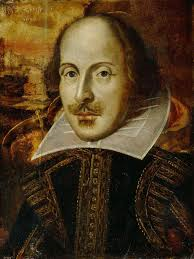 William Shakespeare 1564-1616
William Shakespeare 1564-1616
I was busy all summer with family and preparation for our trip to France and tour of England...so I managed to miss Shakespeare in the Park, annual performances here in Milwaukee, plus I didn't get to Spring Green, WI, for the American Players Theatre - always excellent and frequently Shakespeare.
But I did see some Shakespeare in Paris! SEE being the relevant verb. Didn't hear any! One morning we visited the Musée Delacroix where an exhibition of Shakespeare works by artist Eugène Delacroix was on display. The museum is small, but since it is located in his studio -- atelier -- it is a special treat.
 Eugène Delacroix (1798-1863)1865 sculpture by Antoine Etex (1808-1888)
Eugène Delacroix (1798-1863)1865 sculpture by Antoine Etex (1808-1888)
 Delacroix self portrait as Ravenswood (Scott) -- or possibly Hamlet
Delacroix self portrait as Ravenswood (Scott) -- or possibly Hamlet
 Museum image , c. 1821On loan from the musée du Louvre Departments of Paintings
Museum image , c. 1821On loan from the musée du Louvre Departments of Paintings
 Romeo and Juliet
Romeo and Juliet
 Hamlet and the ghost
Hamlet and the ghost
The exhibition had many of the plates created by Delacroix for his illustrations of Shakespeare's works, to which the French artist was dedicated.
 Studio from the Garden
Studio from the Garden
 Delacroix Studio Garden
Delacroix Studio Garden
 Place de Furstenberg, near the musée Delacroix
Place de Furstenberg, near the musée Delacroix
Can I count walking past the Globe in London last August? Well, not really, though I have visited it several times on other trips.

From the sublime to the ridiculous, I sort of closed out the 450th anniversary of Will's birth by attending a hilarious version of:
 Yes, Virginia, there is a Shakespeare!
Yes, Virginia, there is a Shakespeare!
The four actors who cavorted through this performance of The Complete Works of William Shakespeare (Abridged) (Revised) were inspired -- by Will or by the tradition of slapstick I am not sure.
 Will and friend
Will and friend
 Taking bows at the Milwaukee Chamber Theatre
Taking bows at the Milwaukee Chamber Theatre
Well, I admit these few events are a pretty pitiful commemoration of the 450th -- but I'll have another chance at proving my delight in the bard in 2016 -- the 400th anniversary of his death.
 William Shakespeare 1564-1616
William Shakespeare 1564-1616I was busy all summer with family and preparation for our trip to France and tour of England...so I managed to miss Shakespeare in the Park, annual performances here in Milwaukee, plus I didn't get to Spring Green, WI, for the American Players Theatre - always excellent and frequently Shakespeare.
But I did see some Shakespeare in Paris! SEE being the relevant verb. Didn't hear any! One morning we visited the Musée Delacroix where an exhibition of Shakespeare works by artist Eugène Delacroix was on display. The museum is small, but since it is located in his studio -- atelier -- it is a special treat.
 Eugène Delacroix (1798-1863)1865 sculpture by Antoine Etex (1808-1888)
Eugène Delacroix (1798-1863)1865 sculpture by Antoine Etex (1808-1888) Delacroix self portrait as Ravenswood (Scott) -- or possibly Hamlet
Delacroix self portrait as Ravenswood (Scott) -- or possibly Hamlet Museum image , c. 1821On loan from the musée du Louvre Departments of Paintings
Museum image , c. 1821On loan from the musée du Louvre Departments of Paintings Romeo and Juliet
Romeo and Juliet Hamlet and the ghost
Hamlet and the ghostThe exhibition had many of the plates created by Delacroix for his illustrations of Shakespeare's works, to which the French artist was dedicated.
 Studio from the Garden
Studio from the Garden Delacroix Studio Garden
Delacroix Studio Garden Place de Furstenberg, near the musée Delacroix
Place de Furstenberg, near the musée Delacroix Can I count walking past the Globe in London last August? Well, not really, though I have visited it several times on other trips.

From the sublime to the ridiculous, I sort of closed out the 450th anniversary of Will's birth by attending a hilarious version of:
 Yes, Virginia, there is a Shakespeare!
Yes, Virginia, there is a Shakespeare!The four actors who cavorted through this performance of The Complete Works of William Shakespeare (Abridged) (Revised) were inspired -- by Will or by the tradition of slapstick I am not sure.
 Will and friend
Will and friend Taking bows at the Milwaukee Chamber Theatre
Taking bows at the Milwaukee Chamber TheatreWell, I admit these few events are a pretty pitiful commemoration of the 450th -- but I'll have another chance at proving my delight in the bard in 2016 -- the 400th anniversary of his death.
Published on December 29, 2014 00:30
December 26, 2014
BOXING DAY -- WHAT IN THE WORLD?
In Britain, the day after Christmas is known as Boxing Day. Every December 26 I wonder what in the world that means -- and I never find out for sure. Maybe someone can tell me, Victoria, what it is. Definitively!.
 This Cartoon has the right spirit IMHO
This Cartoon has the right spirit IMHO
Here's what Wikipedia says: "The exact etymology of the term "boxing day" is unclear. There are several competing theories, none of which is definitive." This comes after they have already defined Boxing Day as a time when servants get their gifts.
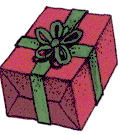
So I turned to Snopes -- which says the claim that Boxing Day means it is time to get rid of Christmas boxes is false... so where besides Nordstrom's do stores have boxes any more?
Snopes goes on: "The holiday's roots can be traced to Britain, where Boxing Day is also known as St. Stephen's Day. Reduced to the simplest essence, its origins are found in a long-ago practice of giving cash or durable goods to those of the lower classes. Gifts among equals were exchanged on or before Christmas Day, but beneficences to those less fortunate were bestowed the day after. And that's about as much as anyone can definitively say about its origin because once you step beyond that point, it's straight into the quagmire of debated claims and dueling folklorists."

I was amazed to find how many images Google has for Boxing Day, though they hardly solve the mystery.
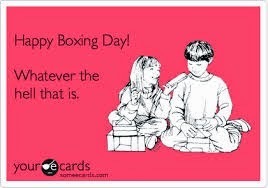
As far as I can tell around here (midwest US), it's the day to run around and buy next year's decorations and wrappings at half price. Perhaps the cats should have the last word on the subject!

 This Cartoon has the right spirit IMHO
This Cartoon has the right spirit IMHOHere's what Wikipedia says: "The exact etymology of the term "boxing day" is unclear. There are several competing theories, none of which is definitive." This comes after they have already defined Boxing Day as a time when servants get their gifts.

So I turned to Snopes -- which says the claim that Boxing Day means it is time to get rid of Christmas boxes is false... so where besides Nordstrom's do stores have boxes any more?
Snopes goes on: "The holiday's roots can be traced to Britain, where Boxing Day is also known as St. Stephen's Day. Reduced to the simplest essence, its origins are found in a long-ago practice of giving cash or durable goods to those of the lower classes. Gifts among equals were exchanged on or before Christmas Day, but beneficences to those less fortunate were bestowed the day after. And that's about as much as anyone can definitively say about its origin because once you step beyond that point, it's straight into the quagmire of debated claims and dueling folklorists."

I was amazed to find how many images Google has for Boxing Day, though they hardly solve the mystery.

As far as I can tell around here (midwest US), it's the day to run around and buy next year's decorations and wrappings at half price. Perhaps the cats should have the last word on the subject!

Published on December 26, 2014 00:00
December 24, 2014
A CHRISTMAS STORY - STARRING THE WEST END
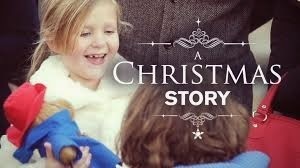
VIDEO FROM VISIT LONDON
MERRY CHRISTMAS AND A HAPPY, HEALTHY,
HISTORY FILLED NEW YEAR
WITH LOVE -
VICTORIA AND KRISTINE
Published on December 24, 2014 23:00
December 23, 2014
VIDEO WEDNESDAY - CHRISTMAS IN ENGLAND
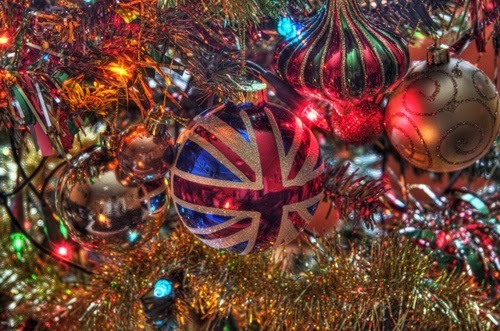
Having spent a few Christmas's in England, I can assure you that there's no where else I'd rather be just now. Since that's impossible (sigh) we're bringing you some yuletide videos that we hope will warm the cockles of your hearts. **
Seasonal activities in London
How to flame a Christmas pudding
2010 Victorian Christmas Festival in Portsmouth
Flashmob of British Army musicians surprises Christmas shoppers in Gateshead's Metrocentre
John Lewis Christmas advert 2014
Sainsbury Christmas 2014 advert remembering soldiers in 1914 - must see!
Victorian Christmas - make your own Christmas cards
How to make a Victorian Christmas pudding
** Definition from www.smh.com.au - One of the meanings of "cockle" is the chamber of a kiln: in reference to the heart, it refers to the chambers, of which there are four (two atria and two ventricles). The heart has always been associated with emotions, especially love, excitement and fear, probably because when we feel a strong emotion we feel our heart thumping and beating faster. So when something "warms the cockles of our heart", it is a reference to something pleasant that makes our heart beat faster and makes us feel good. It is probably also the origin of the saying that something gives us that "warm and fuzzy feeling."
Published on December 23, 2014 23:30
December 21, 2014
LOOSE IN LONDON: KENWOOD HOUSE - PART TWO
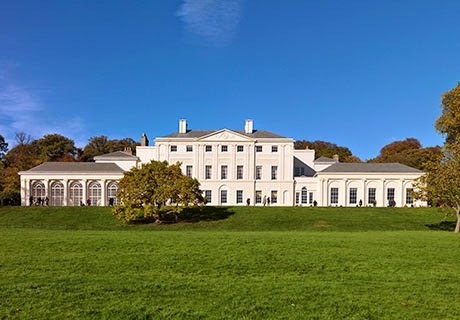 from the website, south facade
from the website, south facade Victoria here, writing about one of my favorite places in London -- Kenwood House. I first visited many years ago and feasted my eyes on the stunning collection of masterworks in the Iveagh Bequest and on the justly famous Adam Library. But I admit, the the rooms used as galleries, were -- aside from the paintings -- quite bland. So I was delighted a few years ago to hear that the whole house was to be renovated and restored to the period, when the 1st Earl of Mansfield purchased the structure and had Robert Adam remodel it in 1764-1779.
 Entrance Hall, 2014
Entrance Hall, 2014When Lord Iveagh purchased the building to house his art collection, it was primarily to be gallery space, but over the years, English Heritage decided to make changes which complement the architecture and the paintings both. And they did a stunning job!
 Entrance Hall
Entrance HallA special bonus for me was the traveling exhibition of most of the Iveagh Bequest paintings in the U.S. in 2013-14, including at the Milwaukee Art Museum where I was able to visit several times. I have written about this exhibition several times on this blog. Click here, and click here and click herefor more on Kenwood and the traveling exhibition. Unless otherwise indicated, the pictures in this post were taken by me in August, 2014.
 Typical Adam Mantelpiece in the Hall
Typical Adam Mantelpiece in the Hall Great Stairs
Great StairsNow Kristine and I were actually here in the refurbished Kenwood House and free to enjoy it at our leisure. And when I say free, I mean it. When Lord Iveagh, one of the heirs of the Guinness Brewery fortune, bequeathed Kenwood and his incredible art collection to the nation in 1927, he specified that his collection should be exhibited free to one and all. The renovations cost about £5.95 million, so don't be surprised that they have a good-will offering suggestion!
 Lord Mansfield's portrait above the fireplace in the library
Lord Mansfield's portrait above the fireplace in the library
 The library ceiling restored
The library ceiling restored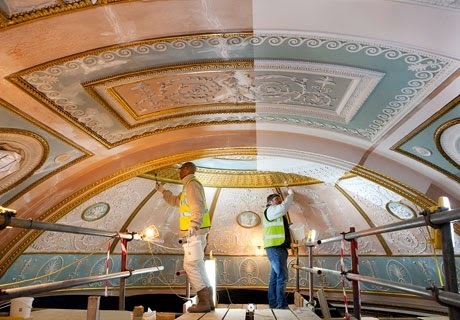 Under restoration, old on the left, new on the right, from the website
Under restoration, old on the left, new on the right, from the website Library
Library
 The library before the restoration of 2012-13, from old sources
The library before the restoration of 2012-13, from old sourcesThe red carpeting overwhelmed the delicacy of the ceiling and wall decoration. You can also see how the colors of the ceiling were restored to their original hues. When you look at the restored version, you realize the former decor was rather gaudy, too much so for authentic Adam.
 The Dining Room's Red walls are quite appropriate.The painting above the fireplace is by Anthony Van Dyke, Princess Henrietta of Lorraine Attended by a Page.
The Dining Room's Red walls are quite appropriate.The painting above the fireplace is by Anthony Van Dyke, Princess Henrietta of Lorraine Attended by a Page.


Elsewhere in the Dining Room are two priceless masterpieces: Rembrandt van Rijn, Portrait of the Artist, above, and
Johannes Vermeer, The Guitar Player, below

 The furniture is certainly equal to the paintings and the setting: a sidetable
The furniture is certainly equal to the paintings and the setting: a sidetable Edwin Landseer, The Hon. E. S. Russell and His Brother, 1934
Edwin Landseer, The Hon. E. S. Russell and His Brother, 1934Children always love this painting of the boys on their ponies with their dogs.
 Angelica Kauffman, RA, The Disarming of Cupid
Angelica Kauffman, RA, The Disarming of CupidKauffman was an excellent painter and did many Georgian interior medallions and other paintings -- and is, in my opinion, quite underrated.

Carlton House Desk; the original was supposedly designed for the Prince of Wales by George Hepplewhite; These were very popular and are found in many country houses in England.

Portrait of Elizabeth Murray and Dido Bell, cousins, once attributed to Johann Zoffany, but currently unattributed; the version hanging at Kenwood is a copy of the original, which can be seen in Scone Palace, Perthshire, Scotland. This painting of Lord Mansfield's wards has long fascinated art experts and social commentators. Dido Bell was the subject of a 2013 film exploring her life and times.
 In the Music Room
In the Music Room Sir Thomas Lawrence, Miss Murray, 1824-26
Sir Thomas Lawrence, Miss Murray, 1824-26 Sir Joshua Reynolds, Mrs. Musters as "Hebe", 1782Another version of this work can be seen in the staircase of Highclere Castle, sometimesin evidence in scenes from Downton Abbey
Sir Joshua Reynolds, Mrs. Musters as "Hebe", 1782Another version of this work can be seen in the staircase of Highclere Castle, sometimesin evidence in scenes from Downton Abbey John Hoppner, Mrs. Jordan as Viola from Shakespeare's Twelfth Night, c.1785-92
John Hoppner, Mrs. Jordan as Viola from Shakespeare's Twelfth Night, c.1785-92 Sir Joshua Reynolds, Kitty Fisher as Cleopatra Dissolving the Pearl, 1759
Sir Joshua Reynolds, Kitty Fisher as Cleopatra Dissolving the Pearl, 1759 Sir Joshua Reynolds, The Brummell Children, 1782
Sir Joshua Reynolds, The Brummell Children, 1782 Magnificent Chimneypiece by Adam, completed in 1773, a fantasy with mermen, flying griffins and cherubs, and panels of Chinese painted marble tiles
Magnificent Chimneypiece by Adam, completed in 1773, a fantasy with mermen, flying griffins and cherubs, and panels of Chinese painted marble tiles 
 Marguerite Hyde, 19th Countess of Suffolk by John Singer Sargent, 1898
Marguerite Hyde, 19th Countess of Suffolk by John Singer Sargent, 1898Also known as Daisy, she was the daughter of Levi Leiter of Chicago, a partner in the Marshall Field. and Co. Department Store. She presented her family's collection of portraits to the nation. They are displayed on the upper level. Here are a few examples, taken from the website.
 Maria Constantina Trevor, Countess of Suffolk, attributed to Catherine Read
Maria Constantina Trevor, Countess of Suffolk, attributed to Catherine Read Elizabeth Home, Countess of Suffolk, artist unknown
Elizabeth Home, Countess of Suffolk, artist unknown Charles II by Sir Godfrey Kneller
Charles II by Sir Godfrey Kneller Catalogue of the Collection
Catalogue of the CollectionTo visit the Kenwood House website, click here.
For more details on the Iveagh Bequest paintings, click here.
For more details on the Suffolk Collection, click here
To buy catalogues and see the Kenwood items in the excellent gift shop, click here.
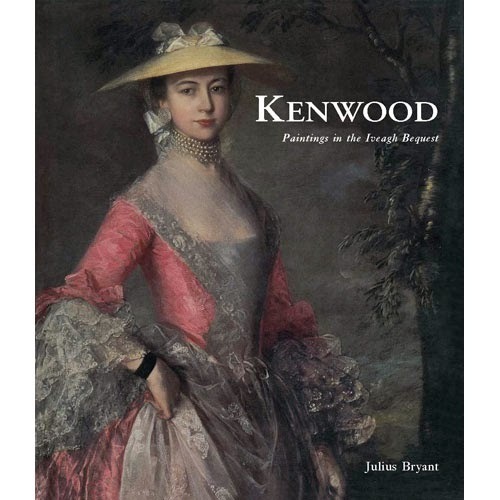
Published on December 21, 2014 23:30
TEXT SANTA DOWNTON ABBEY
Published on December 21, 2014 06:51
December 18, 2014
BYOC – THAT'S "BRING YOUR OWN CHRISTMAS"
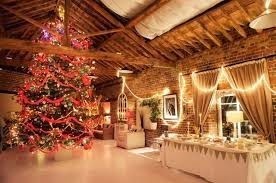
BYOC – that’s "Bring Your Own Christmas” with Grub Club and Airbnb this 25th December
Home alone for Christmas? On 25th December, Grub Club and Airbnb are joining forces to
host the “Bring Your Own Christmas” lunch in aid of Crisis – the national charity for homeless
people. Welcoming 40 guests in a stunning central London location, BYOC will be perfect for
those looking for an alternative way to spend Christmas Day.
Airbnb - the world’s largest community driven hospitality company- has scoured the city to
find the magnificent venue, which forms part of an old converted chocolate factory. Forty
guests will gather in this lofty space, with guests encouraged to bring their version of a festive
dish for four people and a bottle of the good stuff.
One of the only London events held on Christmas Day itself, the BYOC lunch will appeal to
those recently moved to a new city, stuck home alone, or simply looking for something
different to do.
Olivia Sibony, co-founder of Grub Club says: "BYOC exemplifies what Grub Club is all about
– bringing people together to share great experiences over food. And what better time to do
that than on Christmas Day? Rather than sitting at home, stuck in a festive rut, BYOC is a
chance to break the boring Christmas traditions for a feast to remember. We are excited to be
teaming up with Airbnb, who have really changed the face of travel by bringing a community
spirit back to its heart.”
Holly Clarke, acting Country Manager Airbnb UK, “We want to achieve an environment
where, whoever you are and wherever you are in the world, you feel at home. Being away
from your friends and family shouldn’t mean that you miss out on a great Christmas…
Working with Grub Club has created an excellent opportunity to create a home-from-home
experience that really brings London’s global community together. Besides, what more can
you want from Christmas Day than a belt-bursting feast, forty new friends and feel-good
festive fun?!”
To top it off Kabbee are providing the cabs as there is no public transport on the day.... And all of the money made from the ticketing goes to homeless charity Crisis
Bookings for the event can be made via www.grubclub.com.
The lunch will be held on 25th December from 12.30pm – 3.30pm
Food - BYOB, bring a dish to feed four
Cost - £5, with all proceeds donated to Crisis
For press enquiries, please contact Lauryn Cooke at Bacchus on lauryn@bacchus-
pr.com or 020 8968 0202
About Grub Club:
Launched in 2013, Grub Club is dedicated to bringing unique dining experiences to life
through pop-ups and supper clubs, often in interesting and obscure spaces. Hosted by a
range of chefs – from talented amateurs, to Le Cordon Bleu trained and Michelin starred –
Grub Club also acts as a platform for new and aspiring restaurateurs looking to bring their
ideas to market, and facilitates introductions between chefs and venues keen to host an
event. Grub Club recently ran a successful crowd-funding campaign, raising over quarter of a
million pounds to put towards development and growth.
About Airbnb
Founded in August of 2008 and based in San Francisco, California, Airbnb is a trusted
community marketplace for people to list, discover, and book unique accommodations around
the world – online or from a mobile phone. Whether an apartment for a night, a castle for a
week, or a villa for a month, Airbnb connects people to unique travel experiences, at any price
point, in more than 35,000 cities and 190 countries. And with world-class customer service
and a growing community of users, Airbnb is the easiest way for people to monetize their
extra space and showcase it to an audience of millions. In Europe, Airbnb has offices in
Barcelona, Berlin, Copenhagen, Dublin, London, Milan, Moscow and Paris.
Published on December 18, 2014 23:30
December 16, 2014
VIDEO WEDNESDAY - ENGLISH FOOD
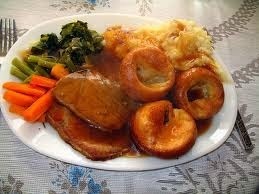
The True History of English Food - Using the iconic cookbook written by Clarissa Dickson Wright, Lucy Worsely investigates the origins and recipes for many British foods. 1 Hour
A People's History of Breakfast, Lunch and Dinner - with Clarissa Dickson Wright. 1 Hour
How to make traditional Scotch eggs
Published on December 16, 2014 23:30
December 15, 2014
HAPPY BIRTHDAY JANE AUSTEN, AGE 239
Victoria, here. December 16, 1775, was the birthday of Jane Austen. We celebrate it every years with teas, luncheons, and assorted presentations. The fact that our venues are all decorated for Christmas gives us an especially festive style, but of course, the real intent of the day has little to do with the holiday season and a lot to do with our regard for Jane Austen's life and work.
 Jeffrey Nigro, Regional Coordinator, and Debra Ann Miller, Program Chair, at JASNA-GCR's Tea at the Fortnightly, Chicago.
Jeffrey Nigro, Regional Coordinator, and Debra Ann Miller, Program Chair, at JASNA-GCR's Tea at the Fortnightly, Chicago.

Jeffrey's talk was entitled Favorable to Tenderness and Sentiment: The Many Meanings of Mary Crawford's Harp, in honor of the 200th anniversary of the publication of Mansfield Park.
Jeffrey brings the approach of a scholar and art historian to his love of Jane Austen. And he presented several interpretations of the meaning of the harp and harp performance in the time of Jane Austen -- approaches I had not considered. George Romney, Lady Caroline Spencer, later Viscountess Clifden, and her Sister, Lady Elizabeth Spencer, 1786-92 The Huntington Library
George Romney, Lady Caroline Spencer, later Viscountess Clifden, and her Sister, Lady Elizabeth Spencer, 1786-92 The Huntington Library
Young ladies of Jane Austen's era were expected to have accomplishments, such as playing the fortepiano and singing. They performed at gatherings of the ton where they were literally on display as part of the marriage mart. The harp not only had a beautiful repertoire, it showed off a young lady's lovely arms as she plucked the strings.
Thus, it is an oft-repeated view of Mary Crawford as a siren playing the harp to attract Edmund Bertram by her seductive skills on the handsome instrument. Marie Antoirette, Queen of the French, was also known to play the harp, so in some eyes it was particularly associated with the 'wicked' French whose morals were not necessarily to be admired.
 Jean-Baptiste André Gautier-DagotyMarie-Antoinette jouant de la harpe dans sa chambre, 1777Musée national du château, Versailles
Jean-Baptiste André Gautier-DagotyMarie-Antoinette jouant de la harpe dans sa chambre, 1777Musée national du château, Versailles
But, As Jeffrey Nigro pointed out, there were other impressions of the harp, dissociated with the life of St. Cecelia, for example. Might Edmund see Mary as a kind of St. Cecelia, patron saint of music, at her harp?
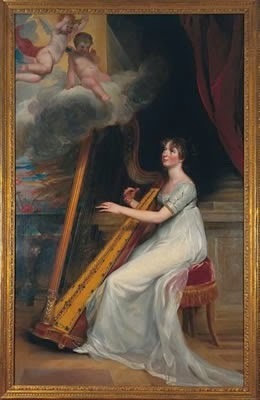 John Singleton Copley, St. Cecilia, A Portrait(Martha Crowninshield Derby), 1803Mint Museum, Charlotte, NC
John Singleton Copley, St. Cecilia, A Portrait(Martha Crowninshield Derby), 1803Mint Museum, Charlotte, NC
Equally possible was the identification of the harp with the Celtic heritage of the British Isles. And a corresponding movement to glorify nature and those pastorals who lived in close harmony with nature. As Jeffrey Nigro made evident, in art and literature of the time, the harp was part of many strands of culture, many of which can challenge our view of Mary Crawford at her harp as the seductress with an eye toward capturing the devotion of Edmund Bertram.
 The Fortnightly's lovely tree
The Fortnightly's lovely tree
 Speaker Sara Bowen with Trish Vanderhoef and Kathy Fish atJASNA-WI's Birthday gala in Nashota, WI
Speaker Sara Bowen with Trish Vanderhoef and Kathy Fish atJASNA-WI's Birthday gala in Nashota, WI
Sara's topic Fanny's Future: Mary's Nightmare: Jane Austen and the Clergy Wife examined another aspect of Mansfield Park and Mary Crawford -- How Mary would have made a poor wife for Edmund once he becomes a parish rector and how Fanny Price will excel in the role she wins.
 Liz Cooper, Cynthia Kartman, and Vivian Walburnat the Red Circle Inn
Liz Cooper, Cynthia Kartman, and Vivian Walburnat the Red Circle Inn
Sara Bowen explained what was expected of a clergy wife in Jane Austen's day, mainly a woman of moral sense -- in the words of George Herbert, author of "The Country Parson," a clergymen should Make his "choice of wife by ear not eye." She was expected to have discretion, though not necessarily more religious fervor than usual at church.
 A Toast to Jane Austen in celebration of her birthday
A Toast to Jane Austen in celebration of her birthday
Mary Crawford's repeated questioning of Edmund on why he wanted to become ordained might be a challenge to Edmund. Was perhaps his intent on converting Mary part of her allure for him? But we know her sharp tongue, sophisticated (maybe even cynical) eye and her self-admitted selfishness would make her life as a clergy-wife unbearable. Fanny, however, with her clarity of moral purpose and her love of nature and country life was much better suited to the role.
 The Red Circle's lovely tree
The Red Circle's lovely tree
Both birthday presentations enlightened us in our 200-year-old admiration of Jane Austen's novel, Mansfield Park. Thank you Jeffry and Sara, and all the volunteers whose hard work makes JASNA so rewarding for its members.
 Jeffrey Nigro, Regional Coordinator, and Debra Ann Miller, Program Chair, at JASNA-GCR's Tea at the Fortnightly, Chicago.
Jeffrey Nigro, Regional Coordinator, and Debra Ann Miller, Program Chair, at JASNA-GCR's Tea at the Fortnightly, Chicago.
Jeffrey's talk was entitled Favorable to Tenderness and Sentiment: The Many Meanings of Mary Crawford's Harp, in honor of the 200th anniversary of the publication of Mansfield Park.
Jeffrey brings the approach of a scholar and art historian to his love of Jane Austen. And he presented several interpretations of the meaning of the harp and harp performance in the time of Jane Austen -- approaches I had not considered.
 George Romney, Lady Caroline Spencer, later Viscountess Clifden, and her Sister, Lady Elizabeth Spencer, 1786-92 The Huntington Library
George Romney, Lady Caroline Spencer, later Viscountess Clifden, and her Sister, Lady Elizabeth Spencer, 1786-92 The Huntington Library Young ladies of Jane Austen's era were expected to have accomplishments, such as playing the fortepiano and singing. They performed at gatherings of the ton where they were literally on display as part of the marriage mart. The harp not only had a beautiful repertoire, it showed off a young lady's lovely arms as she plucked the strings.
Thus, it is an oft-repeated view of Mary Crawford as a siren playing the harp to attract Edmund Bertram by her seductive skills on the handsome instrument. Marie Antoirette, Queen of the French, was also known to play the harp, so in some eyes it was particularly associated with the 'wicked' French whose morals were not necessarily to be admired.
 Jean-Baptiste André Gautier-DagotyMarie-Antoinette jouant de la harpe dans sa chambre, 1777Musée national du château, Versailles
Jean-Baptiste André Gautier-DagotyMarie-Antoinette jouant de la harpe dans sa chambre, 1777Musée national du château, VersaillesBut, As Jeffrey Nigro pointed out, there were other impressions of the harp, dissociated with the life of St. Cecelia, for example. Might Edmund see Mary as a kind of St. Cecelia, patron saint of music, at her harp?
 John Singleton Copley, St. Cecilia, A Portrait(Martha Crowninshield Derby), 1803Mint Museum, Charlotte, NC
John Singleton Copley, St. Cecilia, A Portrait(Martha Crowninshield Derby), 1803Mint Museum, Charlotte, NCEqually possible was the identification of the harp with the Celtic heritage of the British Isles. And a corresponding movement to glorify nature and those pastorals who lived in close harmony with nature. As Jeffrey Nigro made evident, in art and literature of the time, the harp was part of many strands of culture, many of which can challenge our view of Mary Crawford at her harp as the seductress with an eye toward capturing the devotion of Edmund Bertram.
 The Fortnightly's lovely tree
The Fortnightly's lovely tree Speaker Sara Bowen with Trish Vanderhoef and Kathy Fish atJASNA-WI's Birthday gala in Nashota, WI
Speaker Sara Bowen with Trish Vanderhoef and Kathy Fish atJASNA-WI's Birthday gala in Nashota, WISara's topic Fanny's Future: Mary's Nightmare: Jane Austen and the Clergy Wife examined another aspect of Mansfield Park and Mary Crawford -- How Mary would have made a poor wife for Edmund once he becomes a parish rector and how Fanny Price will excel in the role she wins.
 Liz Cooper, Cynthia Kartman, and Vivian Walburnat the Red Circle Inn
Liz Cooper, Cynthia Kartman, and Vivian Walburnat the Red Circle InnSara Bowen explained what was expected of a clergy wife in Jane Austen's day, mainly a woman of moral sense -- in the words of George Herbert, author of "The Country Parson," a clergymen should Make his "choice of wife by ear not eye." She was expected to have discretion, though not necessarily more religious fervor than usual at church.
 A Toast to Jane Austen in celebration of her birthday
A Toast to Jane Austen in celebration of her birthdayMary Crawford's repeated questioning of Edmund on why he wanted to become ordained might be a challenge to Edmund. Was perhaps his intent on converting Mary part of her allure for him? But we know her sharp tongue, sophisticated (maybe even cynical) eye and her self-admitted selfishness would make her life as a clergy-wife unbearable. Fanny, however, with her clarity of moral purpose and her love of nature and country life was much better suited to the role.
 The Red Circle's lovely tree
The Red Circle's lovely treeBoth birthday presentations enlightened us in our 200-year-old admiration of Jane Austen's novel, Mansfield Park. Thank you Jeffry and Sara, and all the volunteers whose hard work makes JASNA so rewarding for its members.
Published on December 15, 2014 00:30
December 12, 2014
ON THE SHELF: AT HOME WITH JANE AUSTEN BY KIM WILSON
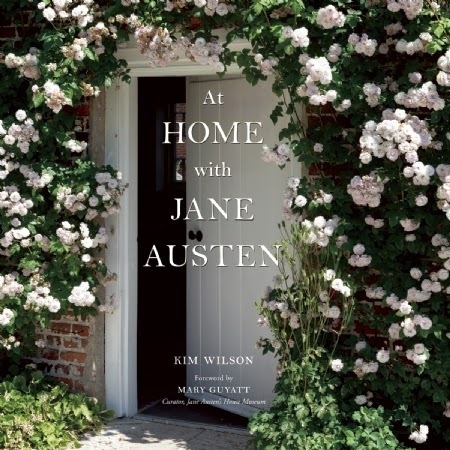 At Home With Jane Austen by Kim Wilson, 2014
At Home With Jane Austen by Kim Wilson, 2014Victoria here, enjoying the wonderful pictures and copy of this new book by my friend and colleague, Kim Wilson. Don't expect anything negative in this "review," because I love everything Kim does unreservedly. I am sure you will agree that all her books -- especially this beautiful edition from Abbeville Press -- deserve all the praise I can muster.
 Kim and Victoria giving a talk at the 2014 Montreal JASNA-AGM
Kim and Victoria giving a talk at the 2014 Montreal JASNA-AGMKim's lively account of Jane Austen's life is complemented with wonderful photographs and reproductions of period prints. Many of the pictures were commissioned from Gavin Kingcome, who portrays even the most familiar of views with an artist's eye. Other photos are taken by Kim herself.

From the very beginning, you will be charmed by the pictures and prose, perfect for enjoying cover to cover or for dipping into briefly during a comforting tea break.
In the foreword by the curator of of Jane Austen's House Museum, Chawton, Hampshire, Mary Guyatt writes, "This book cannot fail to encourage your own further exploration..." This is true for a dedicated devotee -- like myself -- or for a newcomer to Austen's life and work.
 Adlestrop Park, Gloucestershire
Adlestrop Park, GloucestershireOur journey with Jane Austen begins at her childhood home in Steventon, Hampshire, where she lived with her parents and sister Cassandra and her many brothers as well as some boarding students Mr. Austen taught in preparation for college. And we accompany her on the many visits she made in rural villages, sophisticated cities, and stately country mansions. Along the way, we learn about her many friends and relatives through her own words from her letters to her sister Cassandra.
 Bath, 1806
Bath, 1806On the many travels around England, we also encounter the settings for Austen's novels, in Bath, Lyme Regis, and London. And we discover clues about the imagined settings she used, such as the estates of Pemberley and Donwell Abbey.
 Chawton Cottage
Chawton CottageGardening, fashion, balls, literature, and the theatre - all pursuits Jane Austen enjoyed - are covered, as well as the personal activities in which she excelled, e.g. playing the piano and writing.
Indulge your Janeite friends, others who need to be initiated into the delights of Austen, and above all yourself -- with a gift of this gorgeous volume by Kim Wilson from Abbeville Press: At Home with Jane Austen.
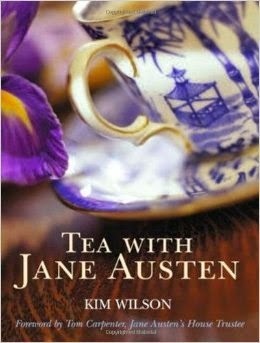
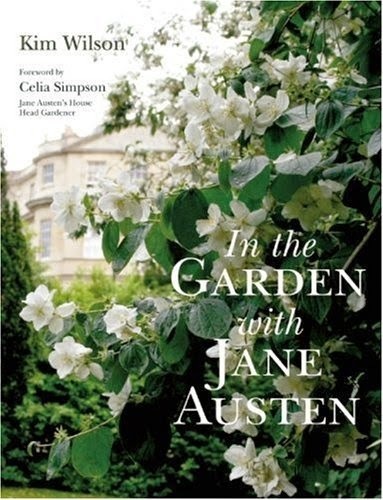
Kim Wilson's previous titles, still available, are Tea with Jane Austen and In the Garden with Jane Austen.
Published on December 12, 2014 00:30
Kristine Hughes's Blog
- Kristine Hughes's profile
- 6 followers
Kristine Hughes isn't a Goodreads Author
(yet),
but they
do have a blog,
so here are some recent posts imported from
their feed.




